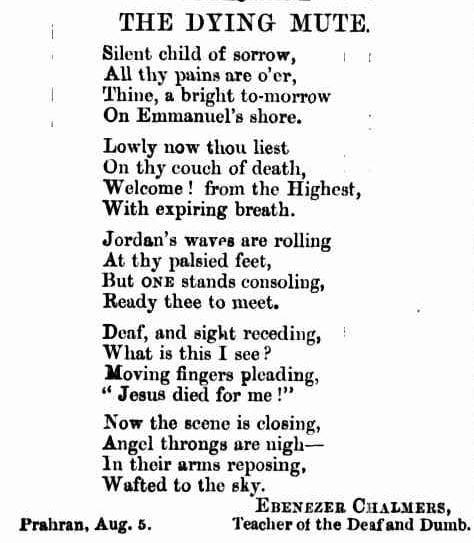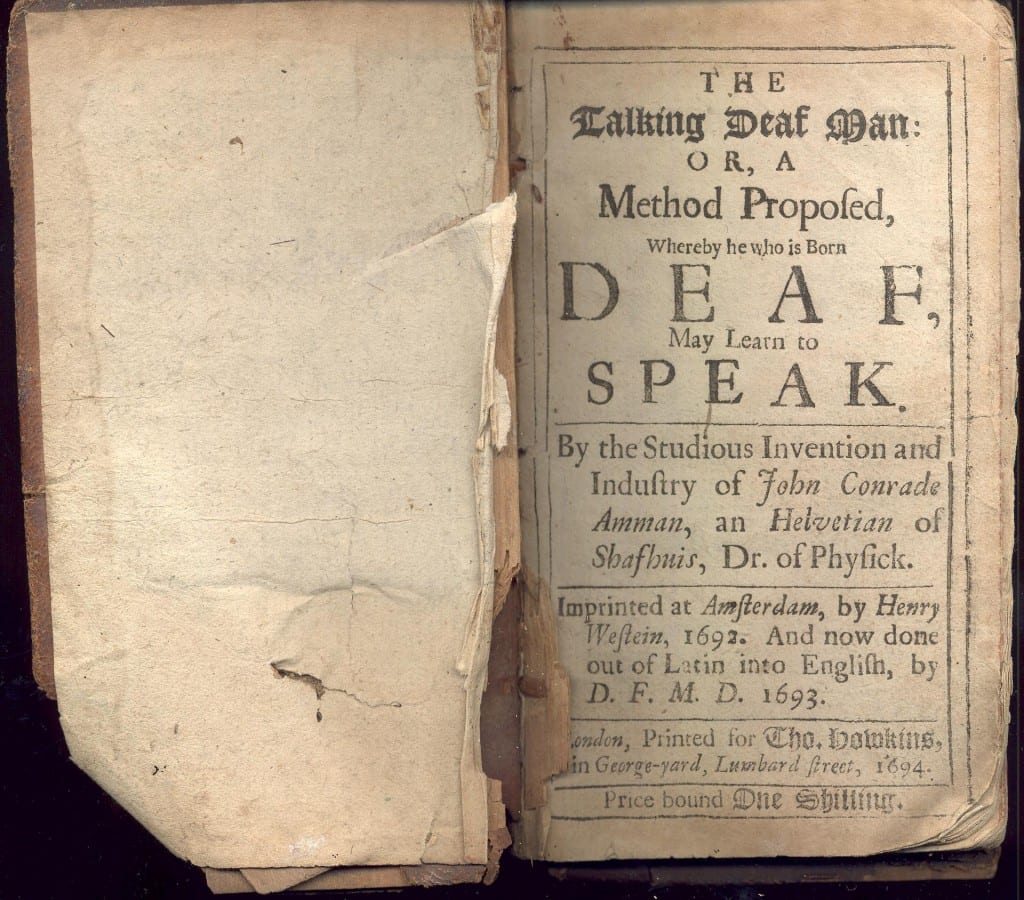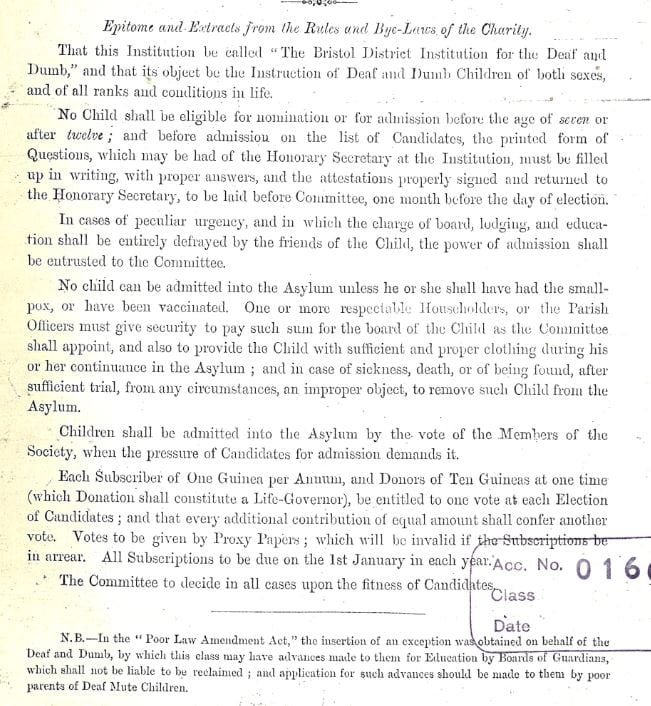Ebenezer Chalmers (1823?-1881) was a Scottish teacher of the deaf, born in Edinburgh in 1823 (or perhaps a little earlier). He worked under the famous Teacher of the Deaf Robert Kinniburgh for 9 years in Edinburgh, according to his essay, Remarks on the Deaf and Dumb, 1849. That would suggest that he started as a pupil-teacher, in other words, a boy-teacher (circa 1838 perhaps, depending on when he was born). The 1841 Scottish census says that he was 20, and that could be accurate, however it may have been rounded up as we find quite often in the 1841 census. It seems that he left the school when Kinniburgh retired (1847) – maybe he was forced out, perhaps he saw another opportunity. I am not clear where he was working from then until 1851, but that year he was at Sandyknowe, Smailholm, near Kelso, probably as a private teacher, in the house of James Hewett (Heweit), a “Farmer Of 600 Acres.” I wonder if it was his two younger children who were deaf, as they were living together and both unmarried many years later (see 1891 Census).
 At this time, the Association in Aid of the Deaf and Dumb was looking for missionaries to work with the deaf of London, as we can see from this note, written by the Secretary Mr Charles Bird, on a copy of the laws of the Association in November 1854. Presumably this was sent to potential candidates for the post(s).
At this time, the Association in Aid of the Deaf and Dumb was looking for missionaries to work with the deaf of London, as we can see from this note, written by the Secretary Mr Charles Bird, on a copy of the laws of the Association in November 1854. Presumably this was sent to potential candidates for the post(s).
On December the 13th of December, 1854, Ebenezer wrote from ‘Sandy Knowe,’ Kelso, to Major Butts of the Association (later RADD), accepting a position as a missionary in London, to start on February 1st, 1855. He did start, being the very first missioner, and made a report for the Association summarised in the Annual Report here, dated the 30th of April – Association Report 1855. However, he did not last long. In the RADD materials at the London Metropolitan Archives, there is a resignation letter dated the 27th of June, 1855, written at 4, Bloomfield Terrace, Pimlico. “I am under deep obligations for your various expressions of kindness towards me since I came to London” and “I have, from a sense of duty, been led to take this step” – but what sense of duty encouraged him to resign?
He was later assistant head at the Institution for Deaf Mutes in Belfast, but I am not sure exactly when, as we have incomplete reports. It would seem he went from London to Belfast, and applied by letter on the 25th of September, 1856, for a job with the Association as Principal of a proposed Infants School, but we may assume that came to nothing. We may speculate that he was not settled happily in Belfast at that time. Perhaps he stayed there until 1869, or maybe returned to Scotland – if you know please contribute below. It is possible that he advertised and worked as a private teacher.
On the 2nd of December, 1869, be sailed on the Asia from Glasgow, bound for Hobson’s Bay in Australia, arriving on the 23rd of April, 1870. Form newspaper reports below, we gather that he was employed for a while as a teacher in the Victorian Institution, Prahan, Melbourne. The Deaf man who founded the school was Frederic John Rose (1831-1920) who had emigrated to Australia in 1852. Rose had been a pupil in the Old Kent Road Asylum. Shortly after Chalmers arrived, he must have approached Rose, unless he had contacted him before he left Scotland. According to a card index of Selwyn Oxley’s in the library, one of Kinniburgh’s sons or grandsons emigrated to Australia in 1849, but I am not clear which and whether the move was permanent. If it was, that person might have been a contact or an example for Chalmers, although it was twenty years later.
Curiously, the ship’s manifest says Chalmers was Irish, rather than from Edinburgh.
This advertisement appeared in an Australian local paper in June 1870 –
EBENEZER CHALMERS, for 30 years teacher of the Deaf and Dumb In Great Britain, and late head assistant In theInstitution for Deaf Mutes, Belfast, Ireland, is anxious to procure private TUITIONS! Apply to F. J. Rose, Esq., Victorian Institution, Prahran. (The Argus, Sat 25 Jun 1870, Page 1 )
Chalmers also tried his hand at writing poetry – perhaps this gave him a few shillings –
THE DYING MUTE.
Silent child of sorrow,
All thy pains are o’er,
Thine, a bright to-morrow
On Emmanuel’s shore.
Lowly now thou liest
On thy couch of death,
Welcome ! from the Highest,
With expiring breath.
Jordan’s waves are rolling
At thy palsied feet,
But ONE stands consoling,
Ready thee to meet.
Deaf, and sight receding,
What is this I see ?
Moving fingers pleading,
” Jesus died for me !”
Now the scene is closing,
Angel throngs are nigh –
In their arms reposing,
Wafted to the sky.
EBENEZER, CHALMERS,
Prahran, Aug. 5. Teacher of the Deaf and Dumb
(The Telegraph, St Kilda, Prahran and South Yarra Guardian,Sat 13 Aug 1870 Page 8)
This next poem shows his Presbyterian religious views –
THE DIAMOND
There is a gem above all gems
Which darkness cannot screen,
It shines in glowing brilliancy
When all gems are unseen.
This princess of the jewel world
Has deck’d the brow of kings,
And sparkled on fair lily hands
And diadems of queens.
Hidden till cut – this peerless gem
Lies buried out of sight,
Like spirits that most nobly shine
In dark affliction’s night.
But there’s a gem that’s brighter far
Than diamonds of earth,
Eternal in its principles
‘Twas heaven that gave it birth.
This Diamond is the WORD OF GOD,
Its rays can pierce the soul;
Destined to shed its matchless rays
With power from pole to ‘pole.’
Its God-given rays for long were hid,
And darkness had its reign,
But Truth eternal rose from dust
In glory, once again.
* * *
A monk sat in his lonely cell,
This diamond on his shelf,
He swept the dust of ages off
He read it for himself.
Its rays pierced grand good Luther’s soul,
And darkness wing’d its way,
And heaven and earth hail’d with delight
Blest “REFORMATION” Day.
Oh! may this diamond shed its light,
‘ O’er earth’s remotest bound,
Then sects shall fade like dying mist
And Paradise be found.
EBENEZER CHALMERS, T.D D. (The Telegraph, St Kilda, Prahran and South Yarra Guardian Sat 4 Nov 1871 Page 8 )
Things began to go wrong for Chalmers, presumably as he could not get sufficient money to have somewhere to stay. The complex story of alcohol and homelessness is a vicious circle, that the local papers describe best –
A man named Ebenezer Chalmers, a teacher, aged 51, living at Prahran, was yesterday afternoon admitted into the Alfred Hospital, suffering from a fracture of the right leg, the result of a fall whilst walking up Chapel street. He was immediately attended to by Dr Cooke, and is progressing favourably. (The Argus, Thu 31 Dec 1874 p.5)
POLICE CASES.- Ebenezer Chalmers was remanded for a week on the charge of having no lawful visible means of support. (The Telegraph, St Kilda, Prahran and South Yarra Guardian Sat 21 Oct 1876 Page 3 )
POLICE CASES. Henry Mores was fined 5s for being drunk and disorderly, and Ebenezer Chalmers was sent to gaol for three months on the charge of being an idle and disorderly person. (The Telegraph, St Kilda, Prahran and South Yarra Guardian Sat 10 Aug 1878 Page 5 )
Ebenezer Chalmer, a man who is said to have once occupied a high position and is only a few days out of gaol was charged with being idle and disorderly. The man was found wandering about the street and was arrested. He was sent to gaol for three months. (The Argus, Tue 25 Feb 1879 , p.7)
MINOR OFFENCES. -Ebenezer Chalmers, who was only out of gaol for a week, was found by Constable O’Connor on Sunday morning last lying in Chapel-street, totally incapable of taking care of himself. The Bench considered, it would be to the benefit, of the unfortunate fellow to send him back again to Pentridge, which they accordingly did for twelve months. (The Telegraph, St Kilda, Prahran and South Yarra Guardian Sat 6 Dec 1879 Page 5 )
A sad instance of the degrading effects of intemperance was brought under the notice of the Prahran, Bench on Monday, when a once respectable man, named Ebenezer Chalmers, was charged with being Idle and disorderly. It seems that but a short time since the unfortunate man occupied a respectable position, and was engaged as a teacher at the Deaf and Dumb Institution, but owing to his intemperate habits, he was dismissed from that post, and gradually reduced himself to his present position. Constable O’Connor found Chalmers in Commercial road in a most wretched condition, and removed him to the lock-up. The Bench sentenced the prisoner to twelve months’ imprisonment. (Weekly Times Sat 6 Dec 1879 Page 18 )
A painful instance of demoralisation was presented at the Prahran Court on 5th Dec, when a man named Ebenezer Chalmers, who at one time held the position of teacher at the Deaf and Dumb Asylum, was brought up, by Sergeant Parkinson, charged with being an idle and disorderly person. He was a well educated man, possessing the university degree of LL.D. Having given way to drink, he had gradually fallen into the most miserable condition. He was sent to gaol for twelve months. (Illustrated Australian News Fri 31 Dec 1880 Page 246 )
GEELONG. (From our own correspondent.) Tuesday Evening. A magisterial inquiry was held to-day by Mr. Pardey, J P , on the body of Ebenezer Chalmers, 58 years of age, a teacher, who was admitted from tho Melbourne Gaol six months since whilst undergoing a sentence of 12 month’s imprisonment for vagrancy, and had been ailing since. Dr. Mackin deposed that death was caused by debility and dropsy, and the magistrate found accordingly. (The Argus, Wed 20 Jul 1881, p. 7)
From a detailed description of Ebenezer in the Victoria Police Gazette 1879 (AU7103-1879) we know he had a ‘fresh’ complexion, auburn to grey hair, and blue eyes (the police record below in the references said his eyes were grey). We can never know what led him to his demise and the sad end of his life.
Poems –
The Deaf Mute Uneducated and Educated
Astronomy
The Old and the Young
The Mute at Prayer
Letters etc
Letter to the Editor 1870
Letter about Disraeli’s works
Bound with The Blind Deaf & Dumb, & some Yorkshire Institution Reports: Remarks on the Deaf and Dumb, 1849
Newspaper reports (also see links above for further reference)
The Argus, Thu 31 Dec 1874 p.5
The Argus, Tue 25 Feb 1879 , p.7
The Argus, Wed 20 Jul 1881, p. 7
Family History records
Death Record 1881
Australian Police Gazette
Series: VPRS 7666; Series Title: Inward Overseas Passenger Lists (British Ports) (via www.ancestry.co.uk)
1851 Scottish Census – Parish: Smailholm; ED: 3; Page: 7; Line: 16; Roll: CSSCT1851_203; Year: 1851
1891 Census Parish: Smailholm; ED: 3; Page: 4; Line: 10; Roll: CSSCT1891_388
Australian Prison Record 41717*
RADD records – LMA 4172/A/10 001*
1841 Census*
*all thanks to Norma McGilp @DeafHeritageUK, who waves her magic historical sources wand!
TO THE DEAF AND DUMB AND THEIR FRIENDS. Price 2s. 6d.. A FAITHFUL AND CHARACTERISTIC LITHOGRAPHED PORTRAIT of MR. MATTHEW ROBERT BURNS, DEAF AND DUMB FROM BIRTH, AND FOR THIRTY TEARS Church of England Biblical Instructor to the Deaf and Dumb. THIS PORTRAIT is not only valuable to his admirers and to the earnest reclaimers from misery and degradation of this section of waste mind, but to the Phsycologist and Philanthropist. Its Photographic correctness gives evidence of the unusual energy of mind and health of body enjoyed at 61 years of age by one who has been educated to active and elevated exertion, whose fellow-sufferers, when neglected and undeveloped, are doomed to much below the averaged period of human existence. Apply, by letter, to Mr Thomas Jacob Cook, 76, Fore-street, City. EC. (1860).
 Close
Close













